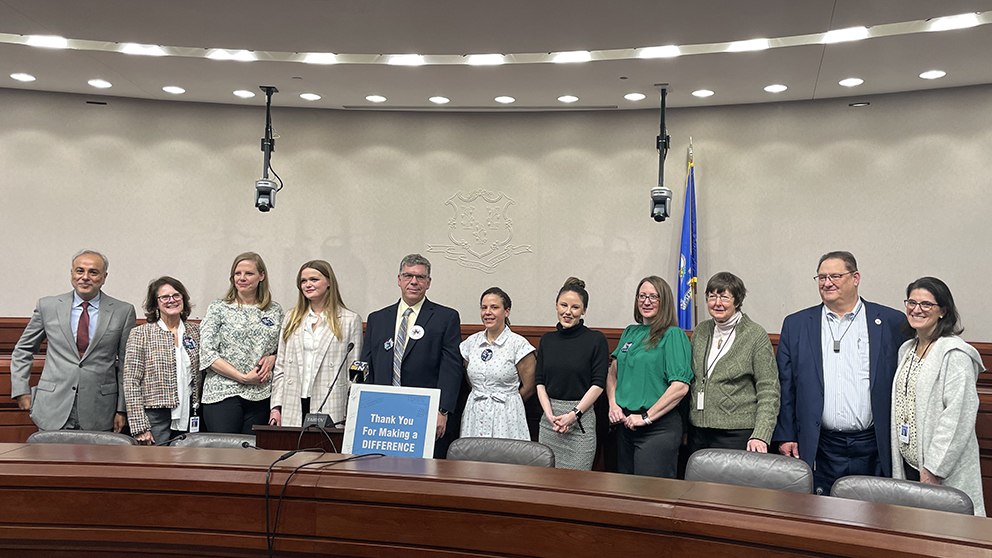
JAX research scientist Joanna Gell, middle, will serve on the Connecticut Rare Disease Advisory Council.
Joanna Gell, MD, research scientist at The Jackson Laboratory (JAX) and pediatric oncologist, has been appointed to a newly-established Connecticut Rare Disease Advisory Council (RDAC). In this role Gell will lend her research expertise to the cross-section of rare disease stakeholders in the group, including patients, physicians, caregivers, hospitals, advocates, and biopharmaceutical representatives.
“It is a great honor to be an appointee of the Connecticut Rare Disease Advisory Council,” said Gell, who is one of six members appointed thus far. “This Council will provide a forum to discuss the unmet needs of patients and families with rare diseases, gain a better understanding of the barriers to access of health care and diagnosis, and supply an official platform to make recommendations to state policymakers on functional solutions for improving quality of life and care for patients with rare diseases.”
The passage and ongoing formulation of the Council was celebrated on March 23, 2023 at a press conference held at the Conn. Legislative Office Building as part of an annual Rare Disease Day celebration hosted by State Senator Saud Anwar, the National Organization for Rare Disorders (NORD) and the CT Rare Action Network. During the morning’s events, more than 20 speakers, including rare disease patients, caregivers, advocates, legislators, researchers, business leaders, and health care providers shared reflections on the rare disease experience, including the often prohibitive costs of treatment, the value of genetic testing and biomedical research and the need for further development of novel technologies to help patients.
From diagnosis to therapy at scale
Gell, who is a physician scientist conducting research at The Jackson Laboratory and also cares for patients with cancer and blood disorders at Connecticut Children’s, focuses on a rare type of tumor called germ cell tumors, which occur in pediatric patients and young adults. She is working on identifying new technologies to help with early diagnosis as well as new therapies that will minimize side effects to patients.
“Over the years there have been many innovations that have come across the research platform that could potentially help patients with rare disease; the ongoing issue is access to getting these tests,” Gell explained. “We now possess many novel technologies that will help identify specific genetic makeup that will help minimize the diagnostic odyssey that often happens with patients of rare disease, that cause lots of undue testing, procedures, hospitalizations until these diagnoses are made.”
JAX’s vision for rare disease research is to provide rare patients and families with an efficient path from diagnosis to therapy at-scale to help far more rare disease patients live fuller, healthier lives than previously possible. To make this vision a reality, JAX’s Rare Disease Translational Center was established to understand the molecular underpinnings of disease symptoms, identify pathways that can be targeted therapeutically, and assess the safety and efficacy of candidate drugs and therapies in biologically accurate mouse models of disease. Led by Cathleen (Cat) Lutz, Ph.D., MBA, who has decades of experience investigating a wide range of rare diseases, the Center investigates both newly diagnosed ultra-rare genetic diseases that affect only a few people worldwide as well as more commonly known conditions such as Duchenne Muscular Dystrophy and Friedreich’s Ataxia.
A stronger voice for rare disease patients
According to Annissa Reed, M.Ph., associate director of state policy at NORD, it still takes rare disease patients an average of five-to-seven years to receive an accurate diagnosis, and more than 90 percent of rare diseases do not have an FDA approved treatment or therapy. Many patients struggle to access affordable care and treatment options. “Fortunately, several states are working to address some of these barriers through the establishment of RDACs,” she said. “We’re excited to share that, including Connecticut, a total of 24 states have signed RDAC legislation into law.”
Reed said that the Council will help to give rare disease patients and families a stronger voice in Connecticut state government, and help drive policies that better support the state’s rare disease community. The RDAC will have the opportunity to advise on various policy issues that impact Connecticut’s rare disease community, including the need for better access to rapid whole genome sequencing for rare disease patients, Medicaid coverage for biomarker testing, respite programs for critically ill children and more.
“This rare disease council is a way for our advocates and community members with various experiences to come together and have a frank discussion with scientists, researchers, industry and advocates,” said Anwar, who co-chairs the Connecticut Public Health Committee. “Early identification, early treatment, and support systems are ways we will be able to change the trajectory of so many people in our communities.”